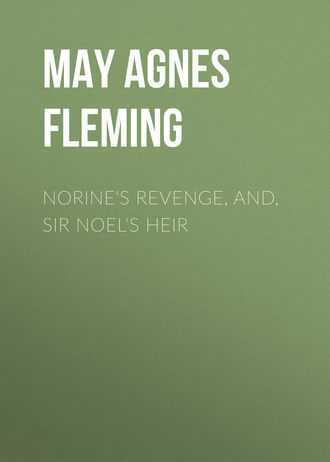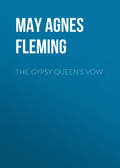
May Agnes Fleming
Norine's Revenge, and, Sir Noel's Heir
CHAPTER IV.
MRS. WEYMORE
Lady Thetford had settled her business satisfactorily with the rector of St. Gosport.
"Nothing could be more opportune," he said. "I am going to London next week on business, which will detain me upwards of a fortnight. I will immediately advertise for such a person as you want."
"You must understand," said her ladyship, "I do not require a young girl. I wish a middle-aged person – a widow, for instance, who has had children of her own. Both Rupert and May are spoiled – May particularly is perfectly unmanageable. A young girl as governess for her would never do."
Mr. Knight departed with these instructions, and the following week started for the great metropolis. An advertisement was at once inserted in the Times newspaper, stating all Lady Thetford's requirements, and desiring immediate application. Another week later, and Lady Thetford received the following communication:
"Dear Lady Thetford – I have been fairly besieged with applications for the past week – all widows, and all professing to be thoroughly competent. Clergymen's widows, doctor's widows, officer's widows – all sorts of widows. I never before thought so many could apply for one situation. I have chosen one in sheer desperation – the widow of a country gentleman in distressed circumstances, whom I think will suit. She is eminently respectable in appearance, quiet and lady-like in manner, with five years' experience in the nursery-governess line, and the highest recommendation from her late employers. She has lost a child, she tells me; and from her looks and manner altogether, I should judge she was a person conversant with misfortune. She will return with me early next week – her name is Mrs. Weymore."
Lady Thetford read this letter with a little sigh of relief – some one else would have the temper and outbreaks of little May to contend with now. She wrote to Captain Everard that same day, to announce his daughter's well being, and inform him that she had found a suitable governess to take charge of her.
The second day of the ensuing week the rector and the new governess arrived. A fly from the railway brought her and her luggage to Thetford Towers late in the afternoon, and she was taken at once to the room that had been prepared for her, whilst the servant went to inform Lady Thetford of her arrival.
"Fetch her here at once," said her ladyship, who was alone, as usual, in the long drawing-room, with the children, "I wish to see her."
Ten minutes after, the drawing-room door was flung open, and "Mrs. Weymore, my lady," announced the footman.
Lady Thetford arose to receive her new dependent, who bowed and stood before her with a somewhat fluttered and embarrassed air. She was quite young, not older than my lady herself, and eminently good-looking. The tall, slender figure, clad in widow's weeds, was as symmetrical as Lady Thetford's own, and the dull black dress set off the pearly fairness of the blonde skin, and the rich abundance of fair hair. Lady Thetford's brows contracted a little; this fair, subdued, gentle-looking, girlish young woman, was hardly the strong-minded, middle-aged matron she had expected to take the nonsense out of obstreperous May Everard.
"Mrs. Weymore, I believe," said Lady Thetford, resuming her fauteuil, "pray be seated. I wished to see you at once, because I am going out this evening. You have had five years' experience as a nursery-governess, Mr. Knight tells me?"
"Yes, Lady Thetford."
There was a little tremor in Mrs. Weymore's low voice, and her blue eyes shifted and fell under Lady Thetford's steady, and somewhat haughty gaze.
"Yet you look young – much younger than I imagined, or wished."
"I am twenty-seven years old, my lady."
That was my lady's own age precisely, but she looked half a dozen years the elder of the two.
"Are you a native of London?"
"No, my lady – of Berkshire."
"And you have been a widow how long?"
What ailed Mrs. Weymore? She was all white and trembling – even her hands, folded and pressed together in her lap, shook in spite of her.
"Eight years and more."
She said it with a sort of sob, hysterically choked. Lady Thetford looked on surprised, and a trifle displeased. She was a very proud woman, and certainly wished for no scene with her hired dependents.
"Eight years is a tolerable time," she said, coolly. "You have lost children?"
"One, my lady."
Again that choked, hysterical sob. My lady went on pitilessly.
"Is it long ago?"
"When – when I lost its father."
"Ah! both together? That was rather hard. Well, I hope you understand the management of children – spoiled ones particularly. Here are the two you are to take charge of. Rupert – May, come here."
The children came over from their corner. Mrs. Weymore drew May towards her, but Sir Rupert held aloof.
"That is my ward – this is my son. I presume Mr. Knight has told you. If you can subdue the temper of that child, you will prove yourself, indeed, a treasure. The east parlor has been fitted up for your use; the children will take their meals there with you; the room adjoining is to be the school-room. I have appointed one of the maids to wait on you. I trust you find your chamber comfortable."
"Exceedingly so, my lady."
"And the terms proposed by Mr. Knight suit you?"
Mrs. Weymore bowed. Lady Thetford rose to close the interview.
"You must need refreshment and rest after your journey. I will not detain you longer. To-morrow your duties commence."
She rang the bell – directed the servant who came to show the governess to the east parlor and to see to her wants, and then to send nurse for the children. Fifteen minutes after she drove away in the pony-phæton; whilst the new governess stood by the window of the east parlor and watched her vanish in the amber haze of the August sunset.
Lady Thetford's business in St. Gosport detained her a couple of hours. The big, white, August moon was rising as she drove slowly homeward, and the nightingales sang their vesper lay in the scented hedge-rows. As she passed the rectory, she saw Mr. Knight leaning over his own gate, enjoying the placid beauty of the summer evening; and Lady Thetford reined in her ponies to speak to him.
"So happy to see your ladyship. Won't you alight and come in? Mrs. Knight will be delighted."
"Not this evening, I think. Had you much trouble about my business?"
"I had applications enough, certainly," laughed the rector. "I had reason to remember Mr. Weller's immortal advice, 'Beware of widders.' How do you like your governess?"
"I have hardly had time to form an opinion. She is younger than I should desire."
"She looks much younger than the age she gives, I know; but that is a common case. I trust my choice will prove satisfactory – her references are excellent. Your ladyship has had an interview with her?"
"A very brief one. Her manner struck me unpleasantly – so odd, and shy, and nervous. I hardly know how to characterize it; but she may be a paragon of governesses, for all that. Good-evening; best regards to Mrs. Knight. Call soon and see how your protégé gets on."
Lady Thetford drove away. As she alighted from the pony-carriage and ascended the great front steps of the house, she saw the pale governess still seated at the window of the east parlor, gazing dejectedly out at the silvery moonlight.
"A most woeful countenance," thought my lady. "There is some deeper grief than the loss of a husband and child eight years ago, the matter with that woman. I don't like her."
No, Lady Thetford did not like the meek and submissive-looking governess, but the children and the rest of the household did. Sir Rupert and little May took to her at once – her gentle voice, her tender smile seemed to win its way to their capricious favor; and before the end of the first week, she had more influence over them than mother and nurse together. The subdued and gentle governess soon had the love of all at Thetford Towers, except its mistress, from Mrs. Hilliard, the stately housekeeper, down. She was so courteous and considerate, so anxious to avoid giving trouble. Above all, that fixed expression of settled sadness on her pale face, made its way to every heart. She had full charge of the children now: they took their meals with her, and she had them in her keeping the best part of the day – an office that was no sinecure. When they were with their nurse, or my lady, the governess sat alone in the east parlor, looking out dreamily at the summer landscape, with her own brooding thoughts.
One evening, when she had been at Thetford Towers over a fortnight, Mrs. Hilliard, coming in, found her sitting dreamily by herself, neither reading nor working. The children were in the drawing-room, and her duties were over for the day.
"I am afraid you don't make yourself at home here," said the good-natured housekeeper; "you stay too much alone, and it isn't good for young people like you."
"I am used to solitude," replied the governess, with a smile that ended in a sigh, "and I have grown to like it. Will you take a seat?"
"No," said Mrs. Hilliard. "I heard you say the other day you would like to go over the house; so, as I have a couple of hours' leisure, I will show it to you now."
The governess rose eagerly.
"I have been wanting to see it so much," she said, "but I feared to give trouble by asking. It is very good of you to think of me, dear Mrs. Hilliard."
"She isn't much used to people thinking of her," reflected the housekeeper, "or she wouldn't be so grateful for trifles. Let me see," aloud, "you have seen the drawing-room, and the library, and that is all, except your own apartments. Well come this way, I'll show you the old south-wing."
Through long corridors, up wide, black, slippery staircases, into vast, unused rooms, where ghostly echoes and darkness had it all to themselves, Mrs. Hilliard led the governess.
"These apartments have been unused since before the late Sir Noel's time," said Mrs. Hilliard; "his father kept them full in the hunting season, and at Christmas time. Since Sir Noel's death, my lady has shut herself up and received no company, and gone nowhere. She is beginning to go out more of late than she has done ever since his death."
Mrs. Hilliard was not looking at the governess, or she might have been surprised at the nervous restlessness and agitation of her manner, as she listened to these very commonplace remarks.
"Lady Thetford was very much attached to her husband, then?" Mrs. Weymore said, her voice tremulous.
"Ah! that she was! She must have been, for his death nearly killed her. It was sudden enough, and shocking enough, goodness knows! I shall never forget that dreadful night. This is the old banqueting-hall, Mrs. Weymore, the largest and dreariest room in the house."
Mrs. Weymore, trembling very much, either with cold or that unaccountable nervousness of hers, hardly looked round at the vast wilderness of a room.
"You were with the late Sir Noel then, when he died?"
"Yes, until my lady came. Ah! it was a dreadful thing. He had taken her to a ball, and riding home his horse threw him. We sent for the doctor and my lady at once; and when she came, all white and scared-like, he sent us out of the room. He was as calm and sensible as you or me, but he seemed to have something on his mind. My lady was shut up with him for about three hours, and then we went in – Dr. Gale and me. I shall never forget that sad sight. Poor Sir Noel was dead, and she was kneeling beside him in her ball-dress, like somebody turned to stone. I spoke to her, and she looked up at me, and then fell back in my arms in a fainting fit. Are you cold, Mrs. Weymore, that you shake so?"
"No – yes – it is this desolate room, I think," the governess answered, hardly able to speak.
"It is desolate. Come, I'll show you the billiard-room, and then we'll go up stairs to the room Sir Noel died in. Everything remains just as it was – no one has ever slept there since. If you only knew, Mrs. Weymore, what a sad time it was; but you do know, poor dear, you have lost a husband yourself."
The governess flung up her hands before her face with a suppressed sob, so full of anguish that the housekeeper stared at her aghast. Almost as quickly she recovered herself again.
"Don't mind me," she said, in a choking voice, "I can't help it. You don't know what I suffered – what I still suffer. Oh, pray, don't mind me."
"Certainly not, my dear," said Mrs. Hilliard, thinking inwardly the governess was a very odd person indeed.
They looked at the billiard-room, where the tables stood, dusty and disused, and the balls lay idly by.
"I don't know when it will be used again," said Mrs. Hilliard, "perhaps not until Sir Rupert grows up. There was a time," lowering her voice, "when I thought he would never live to be as old and strong as he is now. He was the punyist baby, Mrs. Weymore, you ever looked at – nobody thought he would live. And that would have been a pity, you know, for the Thetford estate would have gone to a distant branch of the family. As it would, too, if Sir Rupert had been a girl."
She went up stairs to the inhabited part of the building, followed by Mrs. Weymore, who seemed to grow more and more agitated with every word the old housekeeper said.
"This is Sir Noel's room," said Mrs. Hilliard, in an awe-struck whisper, as if the dead man still lay there; "no one ever enters here but me."
She unlocked it, as she spoke, and went in. Mrs. Weymore followed with a face of frightened pallor that struck even the housekeeper.
"Good gracious me! Mrs. Weymore, what is the matter? You are as pale as a ghost. Are you afraid to enter a room where a person has died?"
Mrs. Weymore's reply was almost inaudible; she stood on the threshold, pallid, trembling, unaccountably moved. The housekeeper glanced at her suspiciously.
"Very odd," she thought, "very! The new governess is either the most nervous person I ever met, or else – no, she can't have known Sir Noel in his lifetime. Of course not."
They left the chamber after a cursory glance around – Mrs. Weymore never advancing beyond the threshold. She had not spoken, and that white pallor made her face ghastly still.
"I'll show you the picture-gallery," said Mrs. Hilliard, "and then, I believe, you will have seen all that is worth seeing at Thetford Towers."
She led the way to a half-lighted room, wainscoted and antique, like all the rest, where long rows of dead and gone Thetfords looked down from the carved walls. There were knights in armor; countesses in ruffles, and powder, and lace; bishops, mitre on head and crozier in hand; and judges in gown and wig. There were ladies in pointed stomachers and jewelled fans, with the waists of their dresses under their arms, but all fair and handsome, and unmistakably alike. Last of all the long array, there was Sir Noel, a fair-haired, handsome youth of twenty, with a smile on his face, and a happy radiance in his blue eyes. And by his side, dark, and haughty, and beautiful, was my lady in her bridal-robes.
"There is not a handsomer face amongst them all than my lady's," said Mrs. Hilliard, with pride. "You ought to have seen her when Sir Noel first brought her home, she was the most beautiful creature I ever looked at. Ah, it was such a pity he was killed. I suppose they'll be having Sir Rupert's taken next and hung beside her. He don't look much like the Thetfords; he's his mother over again – a Vandeleur, dark and still."
If Mrs. Weymore made any reply, the housekeeper did not catch it; she was standing with her face averted, hardly looking at the portraits, and was the first to leave the picture-gallery.
There were a few more rooms to be seen – a drawing-room suite, now closed and disused; an ancient library, with a wonderful stained window, and a vast echoing reception-room. But it was all over at last, and Mrs. Hilliard, with her keys, trotted cheerfully off; and Mrs. Weymore was left to solitude and her own thoughts once more.
A strange person, certainly. She locked the door and fell down on her knees by the bedside, sobbing until her whole form was convulsed.
"Oh! why did I come here? Why did I come here?" came passionately with the wild storm of sobs. "I might have known how it would be! Nearly nine years – nine long, long years, and not to have forgotten yet!"
CHAPTER V.
A JOURNEY TO LONDON
Very slowly, very monotonously went life at Thetford Towers. The only noticeable change was that my lady went rather more into society, and a greater number of visitors came to the manor. There had been a children's party on the occasion of Sir Rupert's eighth birthday, and Mrs. Weymore had played for the little people to dance; and my lady had cast off her chronic gloom, and been handsome and happy as of old. There had been a dinner-party later – an unprecedented event now at Thetford Towers; and the weeds, worn so long, had been discarded, and in diamonds and black velvet Lady Thetford had been beautiful, and stately, and gracious, as a young queen. No one knew the reason of the sudden change, but they accepted the fact just as they found it, and set it down, perhaps, to woman's caprice.
So, slowly the summer passed; autumn came and went, and it was December, and the ninth anniversary of Sir Noel's sudden death.
A gloomy, day – wet, and bleakly cold. The wind, sweeping over the angry sea, surged and roared through the skeleton trees; the rain lashed the windows in rattling gusts; and the leaden sky hung low and frowning over the drenched and dreary earth. A dismal day – very like that other, nine years ago, that had been Sir Noel's last.
In Lady Thetford's boudoir a bright-red coal-fire blazed. Pale-blue curtains of satin damask shut out the winter prospect, and the softest and richest of bright carpets hushed every footfall. Before the fire, on a little table, my lady's breakfast temptingly stood; the silver, old and quaint; the rare antique porcelain sparkling in the ruddy firelight. An easy-chair, carved and gilded, and cushioned in azure velvet, stood by the table; and near my lady's plate lay the letters and papers the morning's mail had brought.
A toy of a clock on the low marble mantel chimed musically ten as my lady entered. In her dainty morning negligée, with her dark hair rippling and falling low on her neck, she looked very young, and fair, and graceful. Behind her came her maid, a blooming English girl, who took off the covers, and poured out my lady's chocolate.
Lady Thetford sank languidly into the azure velvet depths of her chair and took up her letters. There were three – one, a note from her man of business; one, an invitation to a dinner-party; and the third, a big official-looking document, with a huge seal, and no end of postmarks. The languid eyes suddenly lighted; the pale cheeks flushed as she took it eagerly up. It was a letter from India from Captain Everard.
Lady Thetford sipped her chocolate, and read her letter leisurely, with her slippered feet on the shining fender. It was a long letter, and she read it over, slowly, twice, three times before she laid it down. She finished her breakfast, motioned her maid to remove the service, and lying back in her chair, with her deep, dark eyes fixed dreamily on the fire, she fell into a reverie of other days far gone. The lover of her girlhood came back to her from over the sea. He was lying at her feet once more in the long summer days, under the waving trees of her girlhood's home. Ah! how happy, how happy she had been in those by-gone days, before Sir Noel Thetford had come, with his wealth and his title, to tempt her from her love and truth.
Eleven struck, twelve, from the musical clock on the mantel, and still my lady sat, living in the past. Outside the wintry storm raged on; the rain clamored against the curtained glass, and the wind sighed among the trees. With a long sigh my lady awoke from her dream, and mechanically took up the Times newspaper – the first of the little heap.
"Vain, vain," she thought, dreamily; "worse than vain those dreams now. With my own hand I threw back the heart that loved me; of my own free will I resigned the man I loved. And now the old love, that I thought would die in the splendor of my new life, is stronger than ever – and it is nine years too late."
She tried to wrench her thoughts away and fix them on her newspaper. In vain! her eyes wandered aimlessly over the closely-printed columns – her mind was in India with Captain Everard. All at once she started, uttered a sudden, sharp cry, and grasped the paper with dilated eyes and whitening cheeks. At the top of a column of "personal" advertisements was one which her strained eyes literally devoured.
"If Mr. Vyking, who ten years ago left a male infant in charge of Mrs. Martha Brand, wishes to keep that child out of the work-house, he will call, within the next five days, at No. 17 Waddington Street, Lambeth."
Again and again, and again Lady Thetford read this apparently uninteresting advertisement. Slowly the paper dropped into her lap, and she sat staring blankly into the fire.
"At last!" she thought, "at last it has come. I fancied all danger was over – that death, perhaps, had forestalled me; and now, after all these years, I am summoned to keep my broken promise!"
The hue of death had settled on her face; she sat cold and rigid, staring with that blank, fixed gaze into the fire. Ceaselessly beat the rain; wilder grew the December day; steadily the moments wore on, and still she sat in that fixed trance. The ormolu clock struck two – the sound aroused her at last.
"I must!" she said, setting her teeth. "I will! My boy shall not lose his birthright, come what may."
She rose and rang the bell – very pale, but quite calm. Her maid answered the summons.
"Eliza," my lady asked, "at what hour does the afternoon train leave St. Gosport for London?"
Eliza stared – did not know; but would ascertain. In five minutes she was back.
"At half-past three, my lady; and another at seven."
Lady Thetford glanced at the clock – it was a quarter past two.
"Tell William to have the carriage at the door at a quarter-past three; and do you pack my dressing-case, and the few things I shall need for two or three days' absence. I am going to London."
Eliza stood for a moment quite petrified. In all the nine years of her service under my lady, no such order as this had ever been received. To go to London at a moment's notice – my lady, who rarely went beyond her own park gates! Turning away, not quite certain that her ears had not deceived her, my lady's voice arrested her.
"Send Mrs. Weymore to me; and do you lose no time in packing up."
Eliza departed. Mrs. Weymore appeared. My lady had some instructions to give concerning the children during her absence. Then the governess was dismissed, and she was again alone.
Through the wind and rain of the wintry storm, Lady Thetford was driven to the station in time to catch the three-fifty train to the metropolis. She went unattended; with no message to any one, only saying she would be back in three days at the farthest.
In that dull household, where so few events ever disturbed the stagnant quiet, this sudden journey produced an indescribable sensation. What could have taken my lady to London at a moment's notice? Some urgent reason it must have been to force her out of the gloomy seclusion in which she had buried herself since her husband's death. But, discuss it as they might, they could come no nearer the heart of the mystery.







